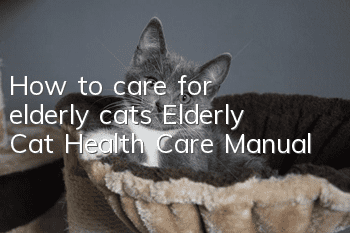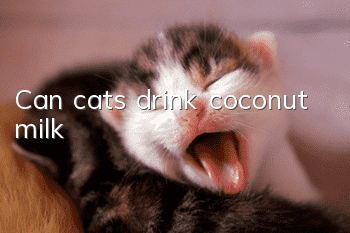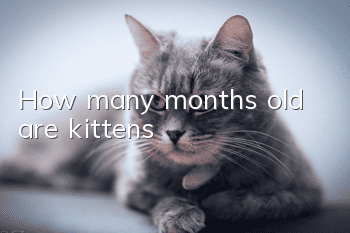How to care for elderly cats Elderly Cat Health Care Manual

Elderly cats should have their nails trimmed regularly to prevent their nails from getting too long and digging into their flesh. And trim the hair regularly and feed hair removal cream to help remove hair. Get regular physical exams and contact your veterinarian promptly if your cat appears abnormal.
Old cats should have their nails trimmed regularly
For example, check your cat's nails weekly. Older cats may not be able to reach and retract their claws as freely as they did when they were younger - they may get caught in gaps such as furniture and carpets; their foot pads may become covered in cat litter. You can take it to your veterinarian to check and trim it correctly to avoid nails that are too long and bend into the flesh, which may require surgery.
Old cats should be groomed regularly
As your cat gets older, she may no longer clean and comb her hair on her own. You need to wipe away secretions from her eyes and nose, and clean up the feces near her anus. You can wipe it with a towel soaked in warm water. You may also need to groom your cat (especially long-haired cats), just be gentle. At the same time, when taking care of them, you can also find out whether there are lumps, rashes, ulcers and other noteworthy problems on their bodies, so that you can contact the veterinarian for treatment in time. When long-haired cats get old, it is difficult to keep themselves clean. If they are frequently combed and their hair is still prone to knotting, it is recommended to trim and groom them appropriately (do not cut or injure the cat yourself, seek professional beautician treatment).
Old cats should be helped to shed their fur regularly
It is a normal physiological phenomenon for cats to vomit hair balls, especially long-haired cats. Cats will use the barbs on their tongue to lick/comb their own hair, and the hair will inevitably enter the stomach, and over time, hair balls will form in the gastrointestinal tract. However, if the cat cannot spit out hair balls normally, it will cause constipation, anorexia, etc. Frequent spitting out hair balls for a long time can also damage the gastrointestinal tract and cause chronic vomiting. We can help the cat comb its hair to reduce the amount of hair entering the cat's body, or feed hair removal cream or hair removal ball cat food to prevent the formation of hair balls in the cat's digestive tract, and also help the hair to be discharged from the body.
Old cats should have their mouths checked regularly
Aging teeth and oral cavity may cause problems. Regular examination of your cat’s oral cavity may help your veterinarian discover changes in your cat’s oral cavity, such as gingivitis, tooth root redness and swelling, and other dental diseases. Bad breath, drooling, poor jaw closure, loss of appetite, persistent mouth opening, etc. may be precursors of dental disease. If the above or other oral abnormalities occur, please contact your veterinarian in time.
Old cats need regular physical examinations
It is recommended for elderly cats to have a physical examination every six months to a year. If there is a pre-existing disease, please ask your veterinarian about the appropriate physical examination time for your cat. Of course, even if your cat goes to the hospital for regular physical examinations, you still need to observe your cat’s daily condition at home. If there is any abnormality, you need to contact the veterinarian for examination in time. The following symptoms are worth noting: 1. Loss of appetite 2. Weight loss 3. The frequency of drinking water increases, or the amount of water consumed increases significantly 4. Stiffness of limbs, limp or difficulty in jumping 5. Drowsiness 6. Lumps or bumps 7. The body cannot maintain balance 8. Abnormal excretion behavior such as excretion outside the litter box, defecation, difficulty urinating, etc. 9. Abnormal behavior, such as increased aggression, barking, and fear of noise.
- Can cats recover from a cold?
- How many owners does a cat know in its lifetime?
- What does it mean when a cat rubs its head against its hand?
- Is it better to neuter a cat in winter or summer?
- Seven causes of cat diarrhea and corresponding treatments?
- What does a cat's hunched back mean?
- What are the consequences of eating too many cat strips?
- Why do cats always lick their fur?
- Do civet cats shed hair?
- What are some signs that your cat hates you?



